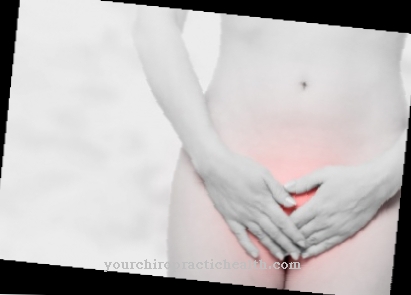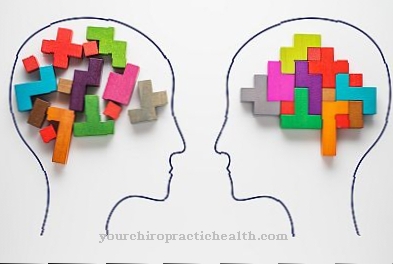In the beginning it only pinches and pinches the shoulder, later migraines can occur. Are to blame Neck pain. But is neck pain really that harmless? Neck pain should also be differentiated from shoulder pain.
What is Neck Pain?

Neck pain is one of the most common types of pain. When one speaks of neck pain, pain in the region of the neck-shoulder-spine beginning is meant.
Here, at the back of the head, there are a particularly large number of nerve and muscle cords. They can quickly lead to neck pain. This pain can be mild to severe. Neck pain can be confined to the neck, but often spreads to other areas.
Even the optic nerve can be affected. Often it is only the doctor who realizes that problems in the neck actually play their part. Neck pain is therefore not always recognizable as such by laypeople, especially if nerve damage has already occurred.
causes
The cause of neck pain is often tense neck and neck muscles. This area of the spine is particularly flexible and therefore prone to disturbances. Sitting for hours at the computer, in front of the television and in the car is not exactly beneficial. This one-sided posture leads to shortened muscles.
Uniform movements over a longer period of time can also be to blame. Painful tension - neck pain - are the result. Elderly carers and nurses often complain of neck pain.
Neck pain is also a warning sign from the body that something is distressing. This can be the fear of losing one's job as well as the worry of not being enough for one's partner. Fear sits on our necks - this saying has not existed in our language for a long time.
You can find your medication here
➔ Medicines for back painDiseases with this symptom
- migraine
- Whiplash
- Meningism
- arthrosis
- disc prolapse
- Scoliosis
- Anxiety disorder
- Spondylosis
- rheumatism
Diagnosis & course
Neck pain is not limited to the neck alone. Most of the time, the pain also radiates to the shoulder, between the shoulder blades and even to the arms. Those affected are often plagued by migraine attacks.
Disturbances of the field of vision are also possible if the hardened muscles in the neck constrict the affected optic nerve. We already speak of chronic neck pain if the pain lasts longer than three months. If it goes badly, neck pain can even lead to paralysis in the arm or hand.
The cramped muscle only needs to pinch a nerve, and the undersupplied area becomes numb. Neck pain is by no means harmless, but a serious warning sign.
Complications
Neck pain is often associated with complications such as headaches or restricted movement. This leads to a bad posture, which triggers further muscle tension. Persistent neck pain can lead to a change in body structure. The back is arched and the shoulders hang forward. It is also possible to tilt the head.
Persistent neck pain leads to impairment of life. Sports activities are no longer carried out as usual. This often triggers a change in wellbeing and the general mood is lowered. Interpersonal tensions are possible. In severe cases, neck pain increases the risk of accidents when driving a car or driving is no longer possible.
When treating neck pain, other causes, such as jaw or tooth pain, may be overlooked. There are side effects associated with taking pain medication. They include the risk of addiction, stomach pain, or irritation of the mucous membranes in the body. Neck pain can be chronic despite treatment.
There is a risk of developing a cervical spine syndrome or a tumor. The complaints trigger a feeling of numbness on the skin. Disc herniations, whiplash injuries or the fracture of a vertebra are further complications. Neck pain can make vascular diseases, rheumatic diseases or infections such as salmonella infections difficult to detect.
When should you go to the doctor?
In most cases, the neck pain occurs due to tension or an incorrect sitting posture. As a rule, treatment by a doctor is not necessary immediately if the neck pain does not persist and severely restricts the person's everyday life. The pain usually disappears when the body has been able to relax or when a healthy sitting posture has been adopted.
However, if the neck pain persists for a long time, treatment by a doctor or physiotherapy is advisable in order to avoid further damage and pain. In any case, medical treatment is necessary if the neck pain occurs after an accident or after a blow in the affected region. If the pain is unbearable, you can also go to the hospital or call an emergency doctor.
In many cases, neck pain occurs after strenuous exercise or after doing certain sports. A visit to the doctor makes sense if the neck hurts over a long period of time and if other regions of the body are also affected.
Doctors & therapists in your area
Treatment & Therapy
Neck pain responds very well to warmth. Warm baths, heating pads and a scarf are a must. Doctors usually prescribe physical therapy for neck pain. Massage and manual therapy are at the beginning, later physiotherapy to build up the weak neck muscles.
In the case of severe pain, medication (tablets or injected into the neck) can help so that the muscles can relax. However, neck pain can become very persistent unless the cause is addressed.This includes a correct sitting posture as well as regular exercise.
Backstroke, gentle stretches, walks and yoga come first. With neck pain, it is important to develop a positive attitude towards life and not to take everything too much to heart. If fear or depression have led to neck pain, the patient should also opt for psychotherapy.
If paralysis has already occurred with neck pain, the doctor will have to consider whether an operation is necessary. After all, a permanently damaged nerve can not only cause neck pain, but in the worst case even partial paralysis or paraplegia.
Outlook & forecast
Neck pain occurs temporarily in many people due to an incorrect sitting posture or a cold draft. In these cases, the neck pain is not a particular complication and does not require any special treatment. They go away on their own when the cause has been eliminated.
Not infrequently, the neck pain pulls up to the ears and head, so that pain can also occur in these regions. Treatment is usually carried out with massages, rest and ointments and in most cases is successful.
Often the neck pain also occurs with other symptoms. These include blurred vision, dizziness, fever, or vomiting. If the neck pain is triggered by stressful situations, there are often noises in the ears and fatigue. In the event of psychological stress, a psychiatrist can be consulted who can relieve the patient's stress and thus reduce the neck pain.
Physiotherapy and pain therapies often help with physical causes. They lead to success for most people. However, the patient must make an effort to lead an active lifestyle and a healthy posture.
You can find your medication here
➔ Medicines for back painprevention
Neck pain is an excellent way to prevent pain. It is important not to stay in the same position for too long. The employer should insist on an ergonomic workplace. If you have to sit for a long time in the office, you should exercise regularly. If you want to be unobserved, you can circle your shoulders, roll your head or do gentle stretching exercises in the hallway or on the toilet.
Neck pain is always an expression of overload. For this reason, those affected should take neck pain seriously and take it easy, both privately and professionally. So that neck pain does not occur in the first place, everyone should check their daily workload and always plan fixed times for doing nothing and relaxing.
You can do that yourself
If you regularly suffer from neck pain, a visit to the doctor is recommended. Mild or irregular pain can be treated independently with the help of various home remedies and measures. First of all, however, you need to adjust your posture. Active sitting, for example on a ball cushion, keeps the spine dynamic and stimulates the neck muscles, while regular stretching exercises provide additional relaxation.
Neck pain after waking up is due to a poor lying position. A neck pillow or a special mattress for side sleepers can help you sleep more relaxed and thereby reduce pain. Switching to a new bed with a suspension that better corresponds to the structure of your own spine and back often helps.
Alternative healing methods such as acupuncture or acupressure can be considered for chronic neck pain. The diverse effects of homeopathic remedies can also provide relief, depending on the cause. Essential oils and Co. are used, for example in the form of ointments and tinctures that are massaged into the neck muscles. Mint oil and chamomile are particularly effective; they are applied neat to the painful area and should provide immediate relief. If the symptoms persist despite everything, a doctor or chiropractor should be consulted for further clarification.












.jpg)



.jpg)










.jpg)
